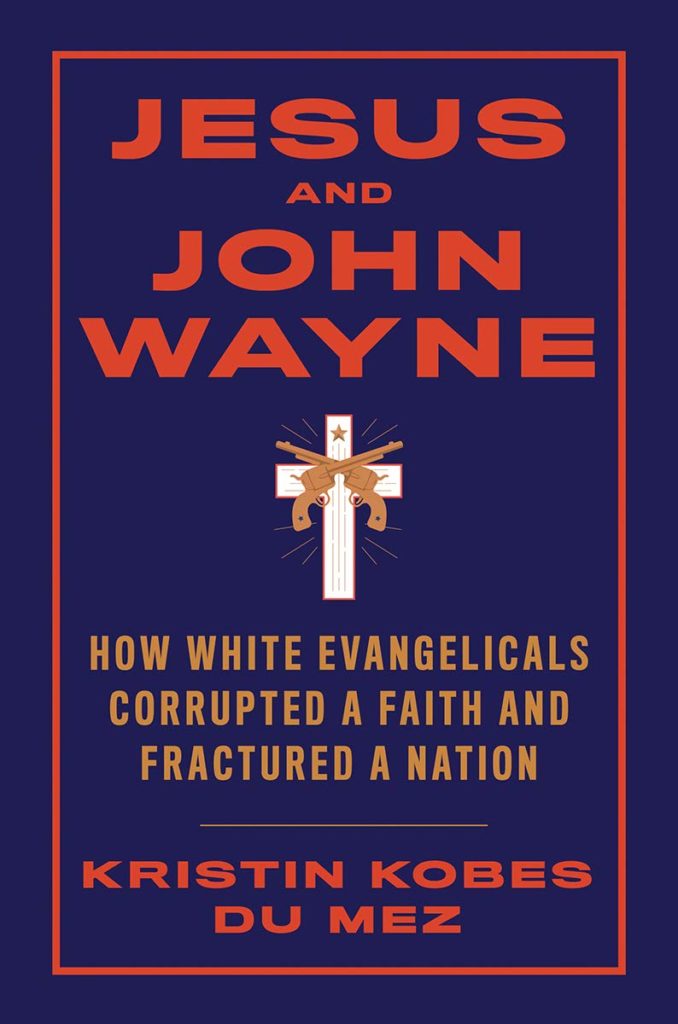Jesus and John Wayne Book Club Discussion Guide
You’ll probably want to pick and choose from among these questions, especially if your book club will be discussing the book in one session. Note that some of the questions draw you into the arguments of the book itself, while others encourage you to reflect on your own experiences. Choose the ones that make most sense for your own group, and of course feel free to add questions of your own!
Question 1: Getting started
“Evangelical” can mean different things to different people. Do you identify as an evangelical? Do you know any evangelicals? When you hear the word “evangelical,” what does it mean to you?
Question 2: Introduction
Jesus and John Wayne centers the role of consumer culture in creating evangelical identity. Looking at the list of examples on p. 7, have you participated in any part of this evangelical consumer culture? What additional examples would you add?
Question 3: Chapter 1
Historians think a lot about both continuity and change. Was there anything that you found surprising in the longer history presented in the first chapter of the book?
Question 4: Chapter 2
If you’re old enough to remember the 1960s, what memories did this chapter stir? How were the 1960s such a pivotal decade in the formation of white evangelical identity?
Question 5: Chapter 3
Evangelical masculinity isn’t just a story about men. How have women helped prop up patriarchal Christianity and militant ideals of Christian masculinity, both past and present?
Question 6: Chapter 4
A key challenge in researching and writing this book was determining what should count as “mainstream” and what should be relegated to the fringes. Over time, my understanding of the relationship between the two shifted; rather than distinguishing the margins from the mainstream, I began to identify affinities. What connections do you see between Gothard and Dobson? Have their teachings shaped your own life? How does their conception of authority shape evangelicalism more broadly?
Question 7: Chapter 5
Evangelicals like to write about sex. A lot. Why do you think that is? What patterns do you see in this chapter (and also in chapter 3) that point to broader implications of evangelical teachings on sex, both personal and political?
Question 8: Chapters 6-7
I may have become a bit obsessed with Oliver North in writing this book. Do you have memories of Ollie? Do you remember him as hero or traitor? Why does North enjoy such a prominent place in the story of Jesus and John Wayne?
Question 9: Chapters 8-9
Do you remember the Promise Keepers? What did you think of PK at the time? How was the evangelical men’s movement of the 1990s different from what came before, and after?
Question 10: Chapters 10-11
Were you aware of the increasingly militant masculinity that came to characterize post-9/11 American evangelicalism? What connections between gender and foreign policy are apparent in this era?
Question 11: Chapters 12-13
Have you observed this embrace of militarism and the US military within American evangelicalism? What are some of the implications of this alliance?
Question 12: Chapters 14-15
Apart from a brief mention in the introduction, Donald Trump doesn’t make an appearance in this book until Ch. 15. How do the previous chapters help make sense of white evangelicals’ embrace of Donald Trump?
Question 13: Chapter 16
This was the hardest chapter at every stage of the writing process: researching, drafting, editing, proofing. More than once I questioned whether the chapter needed to be part of this book. What are your thoughts on this chapter, and how do you see it connecting to the rest of the book? [Side note: I consider Rachael Denhollander’s quote at the top of p. 292 to be the moral center of the book.]
Question 14: Conclusion
Researching and writing this book was in many ways a profoundly discouraging project. The corruption of the faith seemed so entrenched, so endemic to American evangelicalism, that I was left with little hope for change. After finishing the manuscript, my editor asked if I could leave readers with just a bit of hope. I thought about it for a bit, but concluded that no, I didn’t think that I could. A few days later the request came again: “Can you give us something?” It was then that I came up with the last sentence of the book. It felt too feeble at the time. But maybe it isn’t. Where do you find hope in this story?
Question 15: The Tone of the Book
Let’s talk about the tone of the book. One reviewer called the book “urgent” and “sharp-elbowed.” Another says that the book is a model of “history as confession, history as lament.” The subtitle, chapter titles, and occasional snark throughout were intentional choices on my part. Why do you suppose I took this tone? Would you have chosen a different subtitle?
Question 16: Where do we go from here?
If this ideology can in fact be undone, where do we start? What does deconstruction and reconstruction look like in churches, religious organizations, in our political institutions, or perhaps in our own lives? What is required of each of us going forward?

book cover

